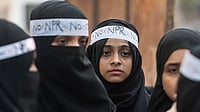Sympathy is piling high at Uddhav Thackeray’s door. Even those who were not traditionally aligned with the Shiv Sena in the past are now speaking in tones that support him. It has dawned on the Shiv Sainiks that the 56-year-old party founded by Balasaheb Thackeray is fast collapsing and the two warring factions – represented by Uddhav Thackeray and Eknath Shinde - with their new symbols and names will stand in place of that Shiv Sena. The burning torch (Mashaal) symbol of the Thackeray faction and the shield and double swords (Dhal-talwar) of the Shinde faction are pitted against each other in the fight for supremacy for a party that has represented the aspirations of the Marathi manoos or the sons-of-the-soil.
The first torch was lit by the Thackeray faction at the memorial of Balasaheb Thackeray, located at the corner of the iconic Shivaji Park in Dadar in central Mumbai. The faction’s cadre has promised to take the burning torch to every house in Maharashtra, thereby ringing in a new era of inclusive politics espoused by Uddhav Thackeray. They want to take the burning torch to every home in Maharashtra. The new tagline of this faction to be henceforth known as Shiv Sena Uddhav Balasaheb Thackeray is ‘har ghar mashaal’.
The rival Shiv Sena camp headed by incumbent chief minister Eknath Shinde too has a new name and a new symbol. To be known as Balasahebanchi Shiv Sena, their new symbol will be a shield with double swords (Dhal-talwar). This faction, supported by the BJP, is diving back into the Hindutva past of the former unified Shiv Sena. With a red vermillion tilak on his forehead, Shinde has promised the Shiv Sainiks that Hindutva will be the core agenda of his faction.
Late night on October 8, the Election Commission of India (ECI), in its interim order decided to freeze the bow and arrow symbol of the 56-year-old Shiv Sena after both factions staked claim to the name and symbol of the party. Neither Thackeray nor Shinde could use the name “Shiv Sena” as a standalone name for the factions headed by them. Both factions will use the new names and symbols as an interim arrangement until the final order of the ECI.
In June this year, Eknath Shinde – one of the strongest mass leaders of the Shiv Sena – had rebelled against Uddhav Thackeray’s leadership. With 40 of the 55 MLAs and 12 of the 18 MPs of the party backing Shinde, he affected a vertical split in the Shiv Sena. Supported by the BJP, Shinde was installed as the chief minister of Maharashtra, while former BJP chief minister Devendra Fadnavis became his deputy. Post the rebellion, both the factions of the Shiv Sena are involved in court battles which, according to sources are expected to be prolonged. While the Shinde faction has also staked claim to the symbol and the name of the party before the ECI, the Thackeray faction is fiercely defending both. Therefore, the ECI’s interim decision to freeze the symbol came as a shock to both factions, said sources.
This is not the first time the Shiv Sena has seen a change in their party symbol. From its formation in June 1966 to December 1989 when the Shiv Sena was recognized by the ECI as a regional party, there was no standalone symbol for the party. So, the Shiv Sena candidates contested elections using numerous symbols. These include the shield and swords, rising sun, coconut tree, railway engine etc. The bow and arrow symbol became the dedicated Shiv Sena symbol on December 13, 1989. In the 1984 Lok Sabha polls, the Shiv Sena candidates Manohar Joshi and Wamanrao Mahadik had even contested under the BJP’s lotus symbol following a poll alliance with the party. Until 1989, the party had lost out on victories due to the lack of an independent symbol.
In the 1985 Maharashtra Assembly polls, Chhagan Bhujbal who was then with the Shiv Sena had contested with the Mashaal as his symbol and won the Mazgaon seat making him a lone Shiv Sena MLA in the Maharashtra Legislative Assembly.
While both factions claim victory with their new symbols as it has been associated with the Shiv Sena in earlier years, the Thackeray faction felt that Mashaal symbol had an upper hand as it is with this symbol that the party came to rule at the BMC. Meanwhile, the Shinde faction claims that their new symbol is representative of the aspirations of the Marathi manoos (sons of the soil) while the name of the rival faction Shiv Sena Uddhav Balasaheb Thackeray represents the aspirations of Uddhav and his son Aaditya.
The bow and arrow symbol has been reserved by the ECI till such time it determines which of the two factions should be recognized as the ‘real’ Shiv Sena. Neither faction can use the party name ‘Shiv Sena’ nor the symbol for the purpose of the bypoll and until the final order of the dispute.
Earlier, the Thackeray faction had given options for three names to the ECI including the Shiv Sena Balasaheb Thackeray, Shiv Sena Balasaheb Prabondhankar Thackeray and Shiv Sena Uddhav Balasaheb Thackeray, the options for symbols included the Trishul (Trident), Rising Sun and Mashaal (Torch). The names proposed by the Shinde faction included Shiv Sena Balasaheb Thackeray, Balsahebanchi Shiv Sena and Balasaheb Thackeray Shiv Sena. His list of symbols included the mace (Gada), rising sun and the trident.
The trident, which was sought by both factions was given to none citing religious connotation. Even the mace symbol sought by the Shinde faction was not allotted citing similar reason. Since the rising sun symbol was reserved for the Dravida Munnetra Kazhagam (DMK), both factions were denied this symbol. The ECI had asked the Shinde faction to submit three other symbol options. In their new submission to the ECI, the Shinde group’s options included the Peepal tree, Shining sun and the Shield and Sword.
The urgency of the interim order was necessitated due to the upcoming bypoll in the Andheri East Assembly constituency. Both factions will be known by the names they choose which, if they so wish can be linked to the name of the parent party ‘Shiv Sena’. Each faction will be allotted different symbols which they may choose from the list of free symbols notified by the ECI for the purpose of the bypoll. Earlier, a similar interim arrangement was ordered in the case of AIADMK and the Lok Janshakti Party (LJP).


























